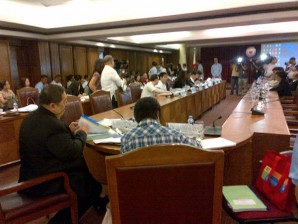Senators hope to keep 60:40 ratio on sin taxes

The bicameral conference committee on the sin tax bill on Thursday December 6, 2012. KAREN BONCOCAN/INQUIRER.net
Senators on the bicameral committee on the sin tax bill would have to consult with their colleagues in caucus before they would agree to any changes in the ratio of the tax burden to be borne by tobacco and alcohol companies.
Sen. Panfilo Lacson painted this scenario on Thursday, hours before he and other members of the Senate bicameral panel met with their counterparts from the House of Representatives to reconcile their respective versions of the sin tax bill.
The possibility of tensions rising over a likely maneuver by the House members to alter the 60:40 ratio of burden-sharing in the new taxes between the tobacco and alcohol industries, respectively, was raised by Sen. Ferdinand Marcos Jr. after the initial bicameral meeting Wednesday.
Heavier on companies
Marcos said the House panel wanted to shift the ratio so the tobacco companies would shoulder a “heavier” portion of the tax burden.
Article continues after this advertisementThe Senate version of the sin tax measure would raise nearly P40 billion in new revenue from tobacco (P23.5 billion) and alcohol (P16 billion).
Article continues after this advertisementThe House bill meanwhile would allow for an incremental increase of P31.3 billion, of which only P5 billion would come from alcohol.
Senate President Juan Ponce Enrile, former ways and means chair Sen. Ralph Recto and Marcos agreed to support the upper chamber’s version of the bill after the other senators vowed to observe the 60:40 tobacco-alcohol ratio of burden-sharing on sin taxes.
Told of Marcos’ statement, acting ways and means chair Sen. Franklin Drilon said the chamber’s version does not contain a specific provision on the 60:40 ratio. This arrangement was only a “guide,” he said.
Caucus before anything
Recto said he and the other members of the Senate bicameral panel would have “no choice but to defend” the ratio since it is the Senate’s position on the sin tax issue.
Lacson said that should the House panel insist on changing the ratio, the senators would be forced to “consult the majority” in the Senate before committing to anything.
“We have to go back to our colleagues because the 60:40 ratio is what we agreed on during a caucus (before the Senate approved the sin tax bill). It’s only proper that the rest be informed before any action is taken,” he told reporters in Filipino at the Kapihan sa Senado forum.
Lacson added that should another caucus be called in the Senate should its panel fail to agree with the House on the tax rates, the decision would be based on inputs by the chamber’s own research team, the Bureau of Internal Revenue (BIR) and the Department of Finance (DOF).
Recto earlier grumbled that while BIR and DOF officials kept quiet when the House approved its version of the sin tax bill, they raised a howl when he sponsored the first sin tax report in October.